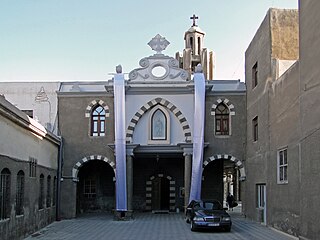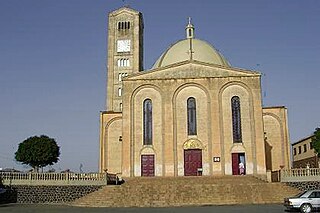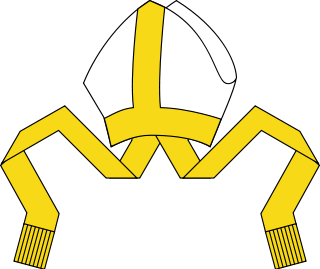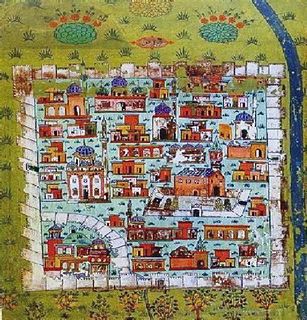
The Syriac Catholic Church is an Eastern Catholic Christian originating in the Levant that uses the West Syriac Rite liturgy and has many practices and rites in common with the Syriac Orthodox Church. Being one of the twenty-three Eastern Catholic Churches, the Syriac Catholic Church is a self-governed sui iuris particular church church while it is in full communion with the Holy See and entirety of the Catholic Church.

An exarch was the holder of any of various historical offices, some of them being political or military and others being ecclesiastical.

The Armenian Apostolic Church is the national church of the Armenian people. Part of Oriental Orthodoxy, it is one of the most ancient Christian institutions. The Kingdom of Armenia was the first state to adopt Christianity as its official religion under the rule of King Tiridates III of the Arsacid dynasty in the early 4th century. According to tradition, the church originated in the missions of Apostles Bartholomew and Thaddeus of Edessa in the 1st century. St. Gregory the Illuminator was the first official primate of the church.

In the Catholic Church, an apostolic visitor is a papal representative with a transient mission to perform a canonical visitation of relatively short duration. The visitor is deputed to investigate a special circumstance in a diocese or country, and to submit a report to the Holy See at the conclusion of the investigation.

The Coptic Catholic Patriarchate of Alexandria is the Patriarchal and only Metropolitan see of the head of the Eastern sui iuris Coptic Catholic Church, a particular Church in the Catholic Church in full communion with the Holy See, which follows the Alexandrian Rite in its own Coptic language. He is thus the superior of all Coptic dioceses, mostly in and around Egypt, the word Copt(ic) being a corruption of the Greek word for Egypt(ian).

The Eritrean Catholic Archeparchy of Asmara, officially the Archeparchy of Asmara, more informally Asmara of the Eritreans, is the metropolitan see of the Metropolitan Eritrean Catholic Church, a sui iuris Eastern Catholic Church whose territory corresponds to that of the State of Eritrea in the Horn of Africa. It depends on the Roman Congregation for the Oriental Churches.

Mikaël Antoine Mouradian, I.C.P.B. is a bishop of the Catholic Church in the United States. He has served as the second eparch (bishop) of the Armenian Catholic Eparchy of Our Lady of Nareg in the United States of America and Canada since 2011.

Manuel Batakian, I.C.P.B. was a bishop of the Catholic Church in the United States. He served as an auxiliary bishop to the Armenian Catholic Patriarch from 1995 to 2000, as the third exarch of the Apostolic Exarchate of United States of America and Canada from 2000 to 2005, and as the first eparch (bishop) of Armenian Catholic Eparchy of Our Lady of Nareg in New York from 2005 to 2011.
Hovhannes Tertsakian, C.A.M. was a bishop of the Catholic Church in the United States. He served as the second exarch of the Apostolic Exarchate of United States of America and Canada of the Armenian Catholic Church from 1995 to 2000.
Nechan Karakéhéyan, I.C.P.B. was an Armenian Catholic archbishop, ordinary of Eastern Europe for Armenian Catholics (2005-2010), Armenian Catholic bishop of Isfahan (2001-2003) and Armenian Catholic ordinary of Greece for Armenian Catholics (1991-2000), titular archbishop of Adana degli Armeni.
Krikor Bedros XX Gabroyan, I.P.C.B. also known in English as Gregory Peter XX Gabroyan and in French as Grégoire Pierre XX Ghabroyan was the Catholicos-Patriarch of Cilicia of the Armenian Catholic Church after his election on 24 July 2015 and the necessary concession of the ecclesiastical full communion by Pope Francis one day later. He was enthroned on 9 August 2015.
The Armenian Catholic Archeparchy of Baghdad is a non-metropolitan Archeparchy of the Armenian Catholic Church, covering Iraq.
The Armenian Catholic Patriarchal Exarchate of Jerusalem and Amman is the missionary pre-diocesan jurisdiction of the Armenian Catholic Church sui iuris in the Holy Land (Palestine/Israel) and (Trans)Jordan.

The Armenian Catholic Eparchy of Alexandria is a suffragan eparchy of the Armenian Catholic Church sui iuris, in the Patriarch's own 'ecclesiastical province of Cilicia', covering Egypt and Sudan.
The Armenian Catholic Eparchy of Qamishli is a suffragan eparchy of the Armenian Catholic Church sui iuris in the Patriarch's own ecclesiastical province 'of Cilicia', serving part of Syria.
The Armenian Catholic Eparchy of San Gregorio de Narek en Buenos Aires in an eparchy of the Armenian Catholic Church for Argentina.
The Armenian Catholic Eparchy of Isfahan is a suffragan eparchy, covering all of Iran, in the ecclesiastical province 'of Cilicia' of the Armenian Catholic Patriarch, the head of the Armenian Catholic Church.

The history of Diyarbakır, one of the largest cities in southeastern Turkey and a metropolitan municipality of Turkey, spans millennia. Diyarbakır is situated on the banks of the Tigris River. The city was first mentioned by Assyrian texts as the capital of a Semitic kingdom. It was ruled by a succession of nearly every polity that controlled Upper Mesopotamia, including the Mitanni, Arameans, Assyrians, Urartu, Armenians, Achaemenid Persians, Medes, Seleucids, and Parthians. The Roman Republic gained control of the city in the first century BC, by which stage it was named "Amida". Amida was then part of the Christian Byzantine Empire until the seventh century Muslim conquest, after which a variety of Muslim polities gave way to the Ottoman Empire in the 16th century. It has been part of the Republic of Turkey since the dissolution of the Ottoman Empire in the early 20th century.

The Ordinariate for Eastern (Rite) Catholics in France is a Catholic Ordinariate for Eastern Catholic faithful, jointly for Eastern Catholics in various rites and languages of particular churches sui iuris without proper jurisdiction there.










